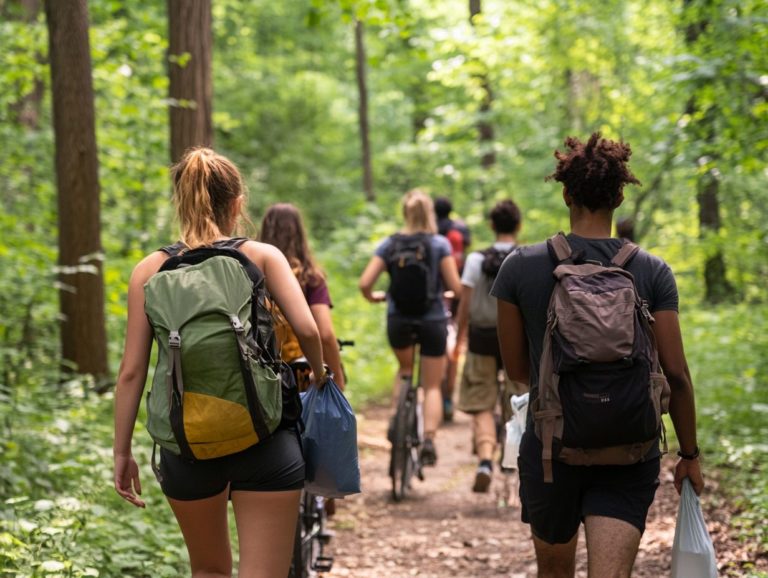What Are the Risks of Eco-Tourism?
Eco-tourism offers you a remarkable opportunity to immerse yourself in the splendor of nature while also supporting local communities and conservation initiatives.
Though the concept brings a host of benefits, it also introduces challenges that can result in considerable environmental and social dilemmas. In this article, you ll find a clear definition of eco-tourism, an exploration of its positive impacts, and an examination of the potential negative effects it can have on ecosystems and local populations.
You ll discover best practices that can help ensure eco-tourism remains sustainable and responsible, emphasizing the critical role of mindful travel in safeguarding our planet for future generations.
Contents
- Key Takeaways:
- Understanding Eco-Tourism
- Positive Impacts of Eco-Tourism
- Negative Effects of Ecotourism
- Ways to Mitigate Risks of Ecotourism
- Frequently Asked Questions
- What Are the Risks of Eco-Tourism?
- What are the environmental risks of eco-tourism, including the impact on local communities and natural resources?
- What are the social risks of eco-tourism, especially regarding interactions with indigenous peoples?
- What are the health risks of eco-tourism, particularly in remote areas where tropical diseases like malaria and yellow fever may be prevalent?
- What are the economic risks of eco-tourism, especially in terms of global tourism trends?
- What are the risks of unethical eco-tourism practices that can undermine environmental awareness and conservation efforts?
Key Takeaways:
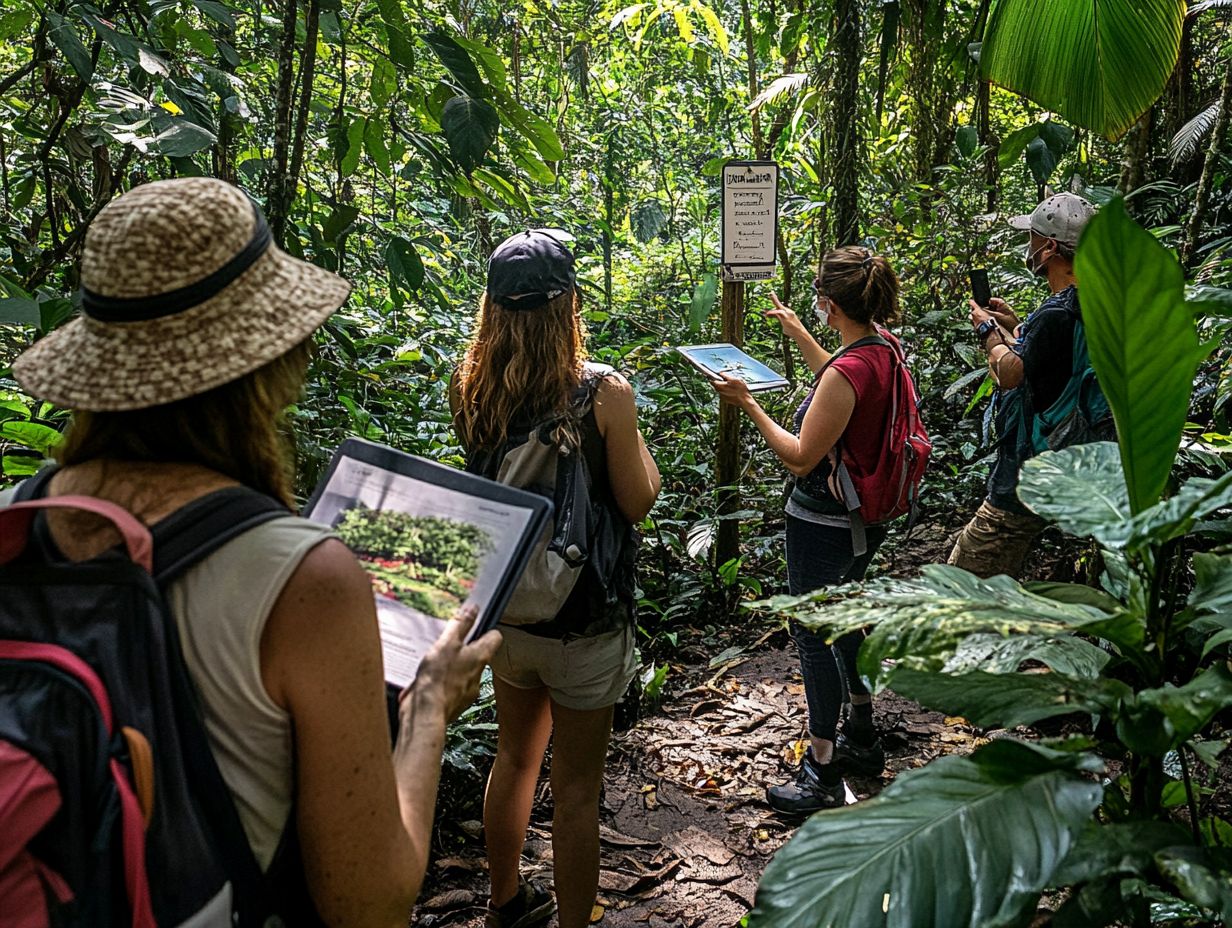
- Eco-tourism can have positive impacts on the environment and local communities, but it also comes with risks.
- Irresponsible eco-tourism can lead to environmental degradation and exploitation of local communities.
- It is crucial for eco-tourism to be practiced responsibly, with sustainable and ethical practices, to mitigate negative effects and ensure community and environmental well-being.
Understanding Eco-Tourism
Eco-tourism represents a refined approach to travel, where sustainability takes center stage. It invites you to immerse yourself in the beauty of the natural world while preserving the environment.
This form of tourism champions the responsible exploration of stunning landscapes be it majestic mountains, flowing rivers, or lush forests while deepening your understanding of biodiversity and advocating for conservation efforts.
By engaging in eco-tourism, you not only enjoy outdoor activities but also contribute positively to local communities and wildlife. This approach keeps the ecological culture vibrant for future generations.
Defining the Concept
The essence of ecotourism lies in your ability to travel responsibly to natural areas that conserve the environment and enhance the well-being of local residents.
This sustainable approach prioritizes the preservation of ecosystems while emphasizing the importance of teaching travelers about the environment. When you engage with your surroundings mindfully, ecotourism allows you to cultivate a deeper understanding of ecological issues.
It also supports local community education about the health risks associated with tourism activities, ultimately fostering community resilience. By focusing on both education and conservation, ecotourism gives you the power to embrace a sense of responsibility that transcends your individual journey, ensuring that both ecosystems and communities thrive for generations to come.
Positive Impacts of Eco-Tourism
Eco-tourism opens up exciting opportunities to make a difference! It enhances environmental awareness among tourists while simultaneously supporting local communities and promoting wildlife conservation.
This approach enriches your travel experience and deepens your understanding of ecological culture, creating a meaningful connection with the environment and the communities you visit. Join the eco-tourism movement today and make a positive impact!
Environmental and Community Benefits
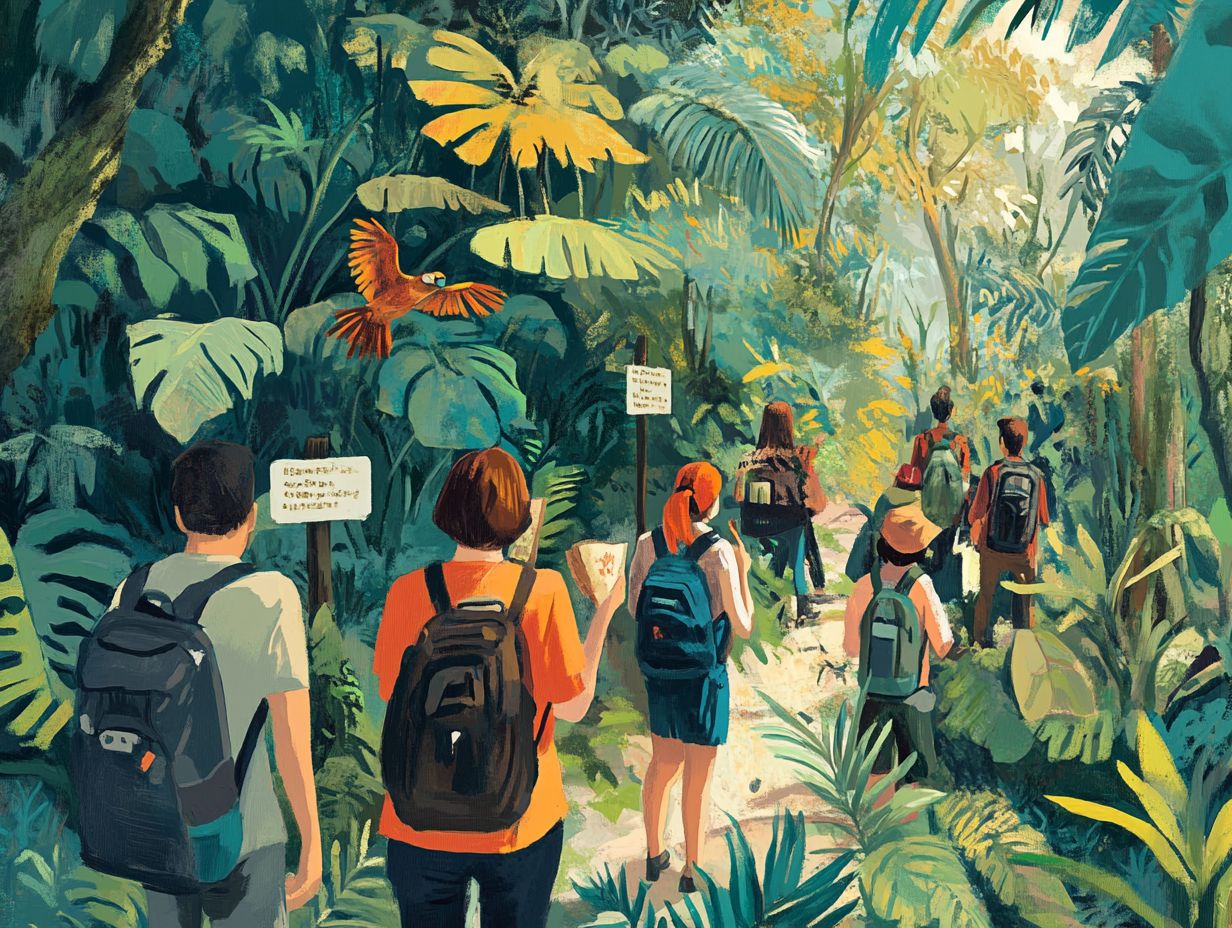
The environmental and community benefits of ecotourism are remarkable. It encourages you to engage in conservation efforts while supporting local residents economically.
By embracing responsible travel practices, you play a significant role in preserving biodiversity, allowing ecosystems to thrive, and reducing the negative impacts of traditional tourism. For example, visiting protected areas helps maintain wildlife habitats and fosters a deeper understanding of the intricate relationships within these ecosystems.
Your participation in ecotourism initiatives can create valuable job opportunities in guiding, hospitality, and local crafts, ultimately enhancing livelihoods. Ecotourism promotes cultural exchange, encouraging you to respect and appreciate indigenous knowledge and traditions. This weaves a rich tapestry of mutual understanding between you and local populations.
Negative Effects of Ecotourism
While ecotourism offers numerous advantages, it can also result in adverse effects, such as environmental damage and exploitation of local communities, if not managed responsibly.
Environmental Damage
Environmental damage poses a significant challenge in ecotourism. Rising visitor numbers can lead to the overuse of natural resources and jeopardize wildlife.
Despite the commendable intentions behind ecotourism, its rapid expansion often outstrips initiatives designed to safeguard fragile ecosystems. While aiming to cultivate a meaningful connection between travelers and nature, an influx of tourists can disrupt delicate habitats, leading to erosion, pollution, and disturbances to local wildlife.
This raises an important question: how can communities balance the economic benefits of tourism with the need for ecological sustainability? Achieving a harmonious relationship between attracting visitors and preserving environmental integrity is crucial. Communities risk irreparable harm if short-term profits overshadow long-term ecological health.
Exploitation of Local Communities
The exploitation of local communities is a pressing concern in ecotourism. The quest for budget-friendly options often overshadows the need for cultural understanding.
This issue can manifest in various ways, such as local artisans receiving inadequate compensation or traditional livelihoods disrupted by mass tourism. You might find that your travel choices contribute to environmental damage and turning local culture into a product to sell, further marginalizing indigenous peoples.
Embracing ethical tourism practices is crucial for cultivating respect and appreciation for local cultures. Engage meaningfully with communities by prioritizing sustainable initiatives that empower local residents and enrich their cultural heritage. The tourism industry can transition from exploitation to genuine collaboration, benefiting both you and the host communities you encounter.
Ways to Mitigate Risks of Ecotourism
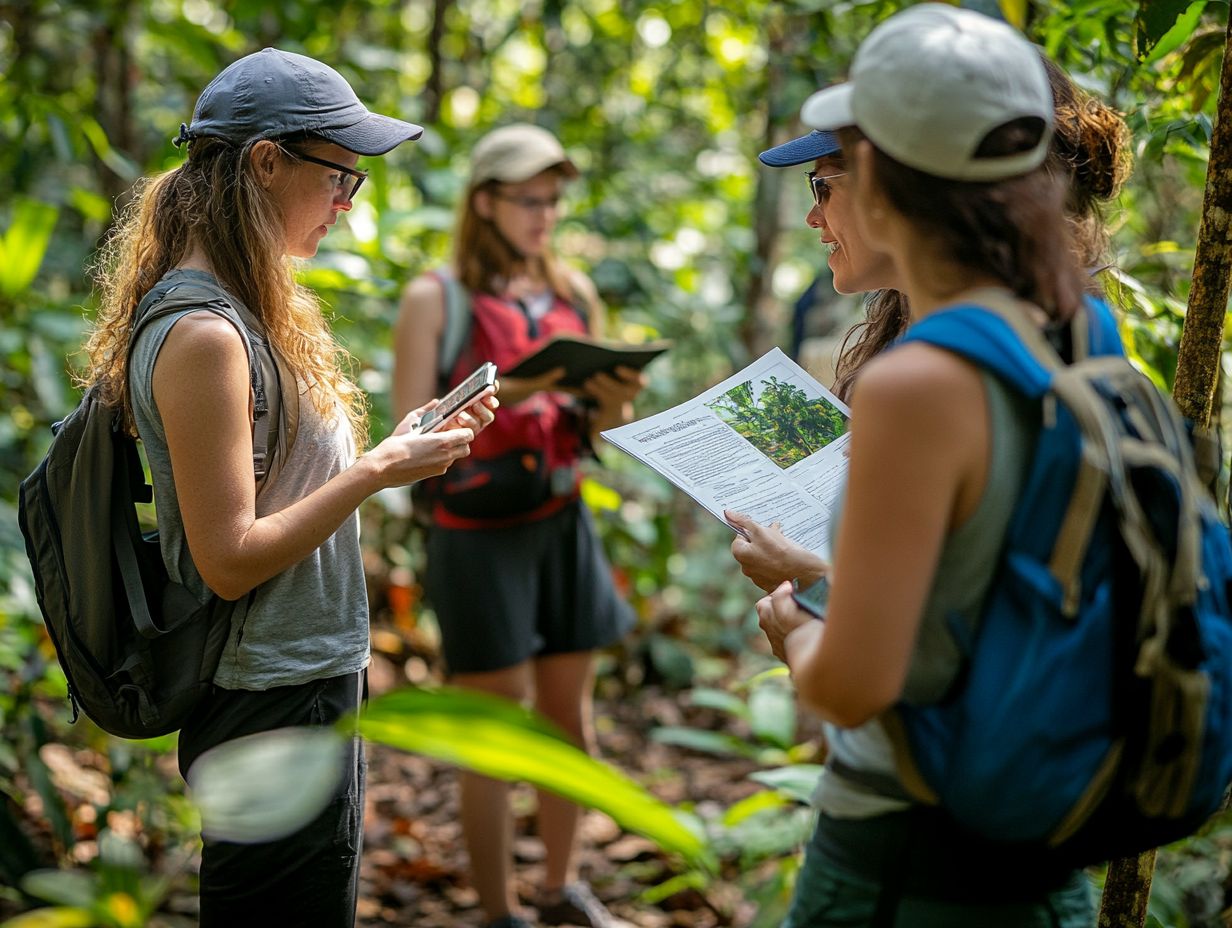
To truly savor the advantages of ecotourism while mitigating risks, join us in embracing sustainable tourism practices that prioritize responsible travel and foster meaningful community engagement.
Best Practices for Sustainable and Responsible Tourism
Implementing best practices for sustainable and responsible tourism can greatly amplify the positive impacts of eco-tourism while mitigating potential drawbacks.
By engaging with local communities, immersing in their customs and traditions, and supporting local businesses, you create a more enriching experience for both yourself and your hosts. It s essential to educate yourself about the environmental challenges facing the regions you visit, ensuring you leave no trace (meaning not leaving behind trash or damaging the environment).
Getting involved in community-led conservation efforts not only nurtures wildlife habitats but also empowers local residents. Embracing responsible travel behaviors like minimizing waste, conserving energy, and respecting natural resources helps preserve these stunning locations for future generations while enhancing your authentic eco-tourism experience.
The Importance of Responsible Eco-Tourism
Responsible eco-tourism is vital. It supports environmental awareness and respects local cultures, making your travels more meaningful.
This approach safeguards natural ecosystems and empowers local communities, encouraging them to preserve their cultural heritage and biodiversity. By prioritizing ethical travel choices, you can significantly mitigate the adverse effects often associated with mass tourism, such as habitat destruction and resource depletion.
Engaging in responsible eco-tourism fosters a mindset centered around sustainability. It inspires you to seek experiences that are both enriching and environmentally conscious. As more travelers embrace this philosophy, your collective efforts can create a positive ripple effect, cultivating a deeper appreciation for nature.
This also promotes practices that protect destinations for generations to come.
Watch this video to learn more about eco-tourism adventures around the world!
Frequently Asked Questions
What Are the Risks of Eco-Tourism?
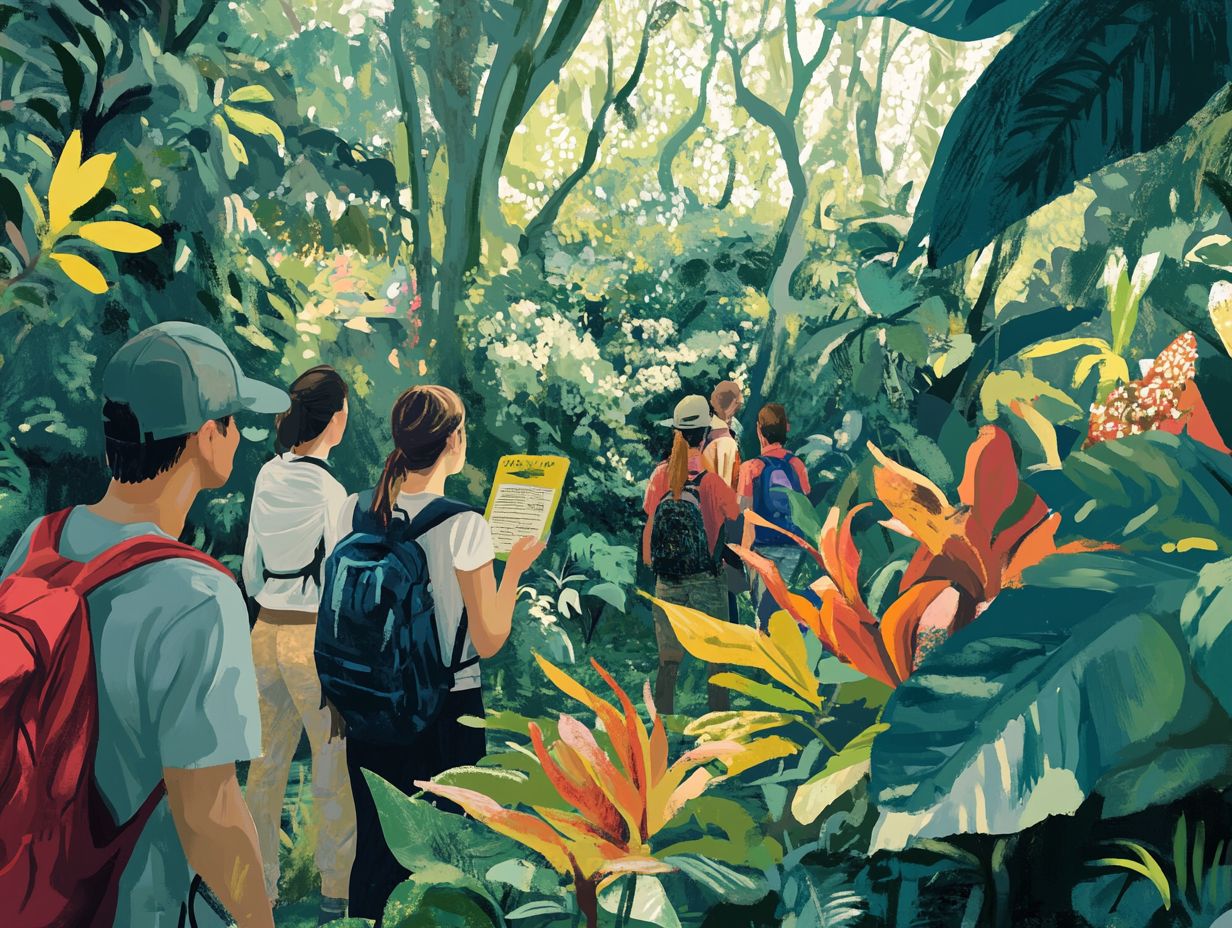
Eco-tourism, also known as sustainable tourism, is a popular way for travelers to experience nature and support conservation efforts. However, like any travel, it has its risks.
What are the environmental risks of eco-tourism, including the impact on local communities and natural resources?
While eco-tourism aims to minimize the negative impact on the environment, potential risks still exist. These include damage to fragile ecosystems, disruption of wildlife habitats, and pollution from increased human activity, which can negatively affect biodiversity.
Eco-tourism often involves visits to local communities and interactions with indigenous cultures. However, this can lead to exploitation of these communities, loss of cultural authenticity, and conflicts over resources, undermining the ecological culture of local residents.
What are the health risks of eco-tourism, particularly in remote areas where tropical diseases like malaria and yellow fever may be prevalent?
Traveling to remote and natural areas for eco-tourism can also pose health risks. These may include exposure to unfamiliar diseases, lack of access to medical facilities, and physical challenges like hiking in rugged terrain.
What are the economic risks of eco-tourism, especially in terms of global tourism trends?
While eco-tourism can bring economic benefits to local communities, it can also create dependency on tourism and lead to unequal distribution of profits. This can affect local communities and their ability to manage resources sustainably, contributing to gentrification and displacement of locals.
What are the risks of unethical eco-tourism practices that can undermine environmental awareness and conservation efforts?
Unfortunately, some operators falsely advertise their tours as eco-friendly or engage in activities that harm the environment or exploit local communities. It is important for travelers to research and choose budget-friendly, responsible, and ethical eco-tourism companies that offer unique experiences while promoting ecological sustainability.




